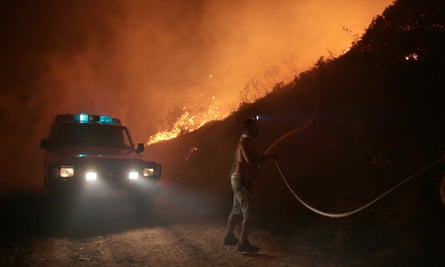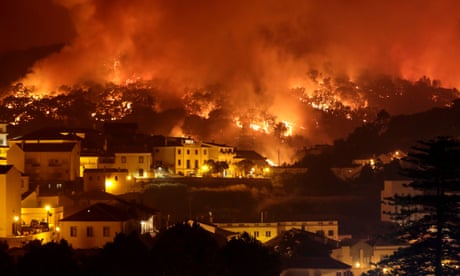European court of human rights case could result in countries being bound to take greater action

The European court of human rights has ordered 33 European governments to respond to a landmark climate lawsuit lodged by six youth campaigners, the Guardian has learned.
The plaintiffs’ British barrister says it could be the most important case ever tried by the Strasbourg-based judges.
In a sign of the urgency of the climate crisis, the court will announce on Monday that it has green-lighted the crowdfunded case, which was filed two months ago. It has already confirmed it will be treated as a priority, which means the process will be fast-tracked.
The states – the EU27 plus Norway, Russia, Switzerland, the UK, Turkey and Ukraine – are obliged to respond by 23 February to the complaints of the plaintiffs, who say governments are moving too slowly to reduce the greenhouse gas emissions that are destabilising the climate.
If the defendant countries fail to convince the Strasbourg-based judges, lawyers say they will be legally bound to take more ambitious steps and to address the contribution they – and multinational companies headquartered in their jurisdictions – make to overseas emissions through trade, deforestation and extractive industries.
“It is no exaggeration to say that this could be the most important case ever tried by the European court of human rights,” said Marc Willers QC, who is representing the young plaintiffs.
He said the onus was on the 33 governments. “We know they are not yet doing enough and the court’s decision to give the case priority status will add to the ever-growing pressure on European governments to act on the science and take the necessary steps to tackle climate change.”
The plaintiffs – four children and two young adults from Portugal – argue tougher climate action is needed to safeguard their future physical and mental wellbeing, to prevent discrimination against the young and protect their rights to exercise outdoors and live without anxiety.
The case was filed in September after Portugal recorded its hottest July in 90 years. It was initiated three years ago after devastating forest fires in Portugal that killed more than 120 people in 2017. Four of the plaintiffs are from Leiria, one of the worst-hit areas. The two other applicants live in Lisbon, which sweltered through record-breaking 44C (111F) heat in 2018.
Twelve-year-old André Oliveira, one of the youth applicants, said in a statement: “It gives me lots of hope to know that the judges in the European court of human rights recognise the urgency of our case. But what I’d like the most would be for European governments to immediately do what the scientists say is necessary to protect our future. Until they do this, we will keep on fighting with more determination than ever.”
The young applicants are being represented by British barristers, including Willers, who is an expert in environmental and climate change law, and supported by the London- and Dublin-based NGO Global Legal Action Network (Glan).
“These brave young people have cleared a major hurdle in their pursuit of a judgment which compels European governments to accelerate their climate mitigation efforts,” said Gerry Liston, Glan’s legal officer. “This comes just weeks ahead of the EU decision on its 2030 emissions target. Nothing less than a 65% reduction by 2030 will be enough for the EU member states to comply with their obligations to the youth applicants and indeed countless others.”
More than 1,300 climate-related lawsuits have been filed worldwide since 1990. The most successful so far was in the Netherlands, where the Urgenda Foundation forced the government into scaling back coal-fired power plants and taking other compliance measures worth about €3bn (£2.7bn).
The impact the Strasbourg judges could have is potentially greater as they sit on a standard-setting court and this case crosses multiple international boundaries.
The court has also taken the unusual step of expanding its consideration of the case by asking the 33 countries to explain whether their failure to tackle global heating violates article 3 of the European convention on human rights, which protects the right not to be subjected to ‘inhumane and degrading treatment’.
The Glan director, Gearóid Ó Cuinn, said he was encouraged by the judges’ sense of urgency. “As only a tiny minority of cases filed with the European court of human rights are fast-tracked and communicated, this development is highly significant. This is an appropriate response from the court given the scale and imminence of the threat these young people face from the climate emergency.”
As the climate crisis escalates ...
… the Guardian will not stay quiet. Millions are flocking to the Guardian every day, and thousands read our environmental reporting every week. Readers in 180 countries, including Greece now support us financially.
Amid the various crises of 2020, we continue to recognise the climate emergency as the defining issue of our lifetimes. We’re determined to uphold our reputation for producing powerful, high-impact environmental journalism that reflects the urgency of the situation and is always grounded in science and truth.
Last year we published a climate pledge, outlining the steps we promised to take in service of the planet. And we’ve made good institutional progress since: we no longer accept advertising from fossil fuel companies and we’re on course to achieve net zero emissions by 2030.
We believe everyone deserves access to quality, trustworthy news and analysis, so we choose to keep our journalism open for all readers, regardless of where they live or what they can afford to pay.
When it’s never been more pertinent, the Guardian’s independence means we can scrutinise, challenge and expose those in power on their climate policies and decisions. We have no shareholders or billionaire owner, meaning all of our journalism is free from commercial and political influence – this makes us different. We can investigate and report without fear or favour.
If there were ever a time to join us, it is now. You have the power to support us through these volatile economic times and enable our journalism to reach more people, in all countries.

Δεν υπάρχουν σχόλια:
Δημοσίευση σχολίου